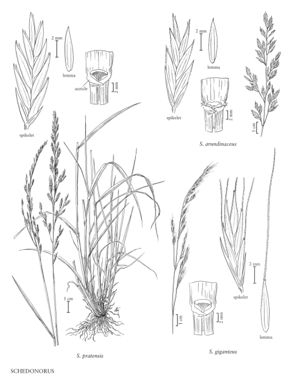Difference between revisions of "Schedonorus giganteus"
FNA>Volume Importer |
FNA>Volume Importer |
||
| Line 7: | Line 7: | ||
|synonyms={{Treatment/ID/Synonym | |synonyms={{Treatment/ID/Synonym | ||
|name=Lolium giganteum | |name=Lolium giganteum | ||
| − | |authority= | + | |authority= |
| + | |rank=species | ||
}} {{Treatment/ID/Synonym | }} {{Treatment/ID/Synonym | ||
|name=Festuca gigantea | |name=Festuca gigantea | ||
| − | |authority= | + | |authority= |
| + | |rank=species | ||
}} | }} | ||
|hierarchy=Poaceae;Poaceae subfam. Pooideae;Poaceae tribe Poeae;Schedonorus;Schedonorus giganteus | |hierarchy=Poaceae;Poaceae subfam. Pooideae;Poaceae tribe Poeae;Schedonorus;Schedonorus giganteus | ||
| Line 23: | Line 25: | ||
-->{{Treatment/Body | -->{{Treatment/Body | ||
|distribution=Ont.;Que.;N.Y.;Mich.;Conn. | |distribution=Ont.;Que.;N.Y.;Mich.;Conn. | ||
| − | |discussion=<p>Schedonorus giganteus is adventive from Europe. It is cultivated as an ornamental, and has escaped to woodland openings and edges and to shaded ravines, at isolated localities in Quebec, Ontario, Michigan, New York, and Connecticut.</p> | + | |discussion=<p><i>Schedonorus giganteus</i> is adventive from Europe. It is cultivated as an ornamental, and has escaped to woodland openings and edges and to shaded ravines, at isolated localities in Quebec, Ontario, Michigan, New York, and Connecticut.</p> |
|tables= | |tables= | ||
|references= | |references= | ||
| Line 32: | Line 34: | ||
-->{{#Taxon: | -->{{#Taxon: | ||
name=Schedonorus giganteus | name=Schedonorus giganteus | ||
| − | |||
|authority=(L.) Holub | |authority=(L.) Holub | ||
|rank=species | |rank=species | ||
| Line 40: | Line 41: | ||
|family=Poaceae | |family=Poaceae | ||
|illustrator=Annaliese Miller | |illustrator=Annaliese Miller | ||
| + | |illustration copyright=Utah State University | ||
|distribution=Ont.;Que.;N.Y.;Mich.;Conn. | |distribution=Ont.;Que.;N.Y.;Mich.;Conn. | ||
|reference=None | |reference=None | ||
| Line 45: | Line 47: | ||
|publication year= | |publication year= | ||
|special status= | |special status= | ||
| − | |source xml=https:// | + | |source xml=https://jpend@bitbucket.org/aafc-mbb/fna-data-curation.git/src/f50eec43f223ca0e34566be0b046453a0960e173/coarse_grained_fna_xml/V24/V24_635.xml |
|subfamily=Poaceae subfam. Pooideae | |subfamily=Poaceae subfam. Pooideae | ||
|tribe=Poaceae tribe Poeae | |tribe=Poaceae tribe Poeae | ||
Revision as of 20:23, 16 December 2019
Plants perennial. Culms to 1.5 m. Leaves convolute in young shoots; auricles glabrous; ligules 0.5-2.5 mm; blades (10)20-40 cm long, 4-18 mm wide. Panicles 8-50 cm; branches usually 2 per node. Spikelets 8-13(20) mm long, 1.5-2.5 mm wide, with 3-10 florets. Lower glumes 4-7 mm; upper glumes 5-8 mm; lemmas 6-9 mm, usually scabrous or hispidulous, rarely smooth, awns 10-18 mm; paleas as long as to slightly longer than the lemmas; anthers 2.5-3 mm. Caryopses 3-4.6 mm long, 1-1.5 mm wide. 2n = 42.
Distribution
Ont., Que., N.Y., Mich., Conn.
Discussion
Schedonorus giganteus is adventive from Europe. It is cultivated as an ornamental, and has escaped to woodland openings and edges and to shaded ravines, at isolated localities in Quebec, Ontario, Michigan, New York, and Connecticut.
Selected References
None.
